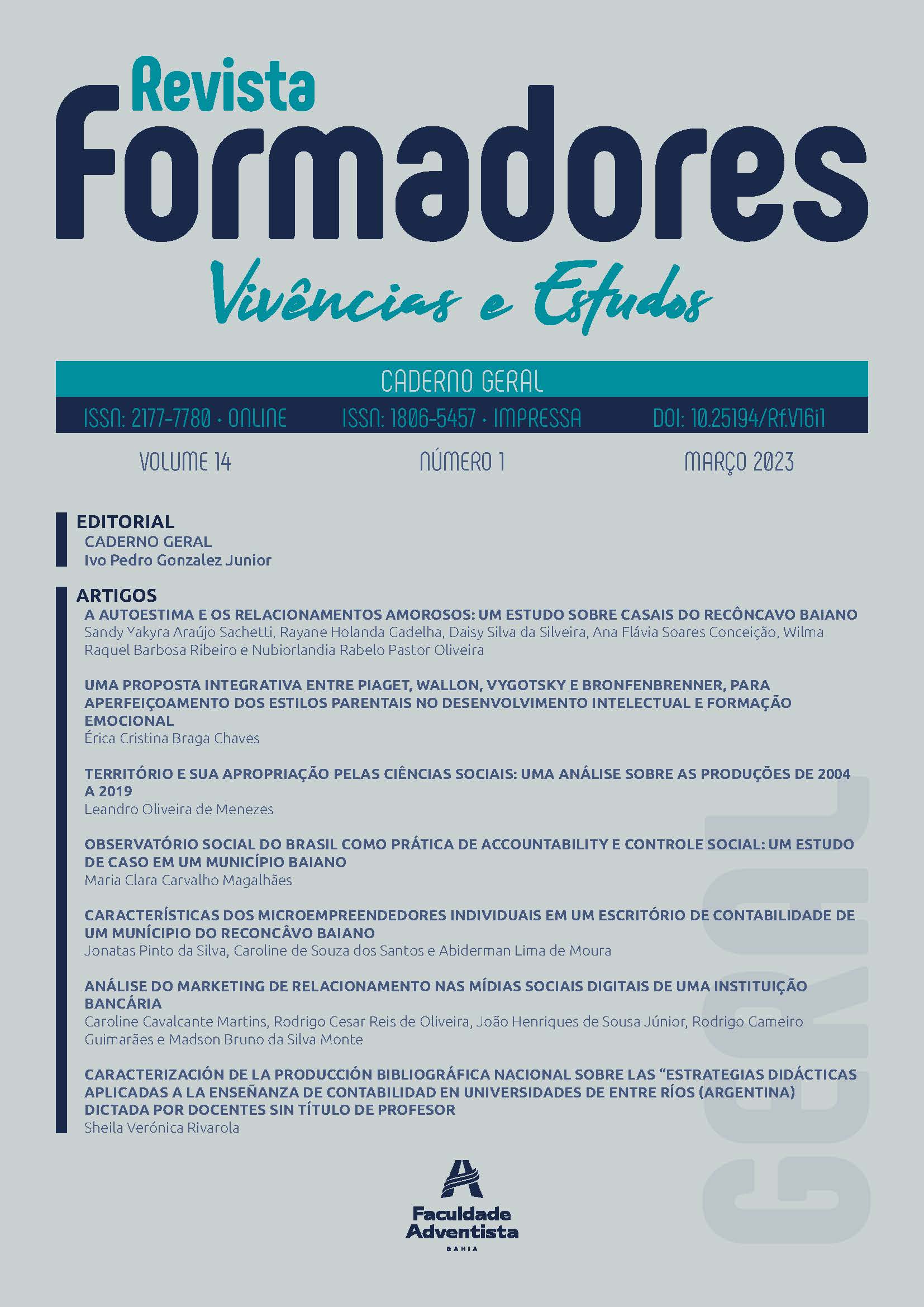A AUTOESTIMA E OS RELACIONAMENTOS AMOROSOS: UM ESTUDO SOBRE CASAIS DO RECÔNCAVO BAIANO
DOI:
https://doi.org/10.25194/rf.v16i1.1474Keywords:
autoestima, satisfação, relacionamentoAbstract
ABSTRACT
This article aims to measure how self-esteem is a beneficial factor in love relationships, serving as a
satisfactory aspect in the subjective experiences of persons who share affective experiences. The objective
of this research is analyze the influence of self-esteem and satisfaction of men and women in a romantic
relationship. A quantitative approach is used, with a group of 60 people, 34 women and 26 men, who live
in the Bahiano Recôncavo, with ages ranging from 20 to 43 years. The instrument used was the Rosenberg
Self-Esteem Scale [EAR] and the ENRICH Marital Satisfaction Scale, both of which assess the variables
described in this research. The results show that individuals with high self-esteem tend to be happier in love
relationships than individuals with low self-esteem. Therefore, this article offers a preliminary discussion
on self-esteem, satisfaction and love in affective relationships, as this topic is of universal interest and may
contain positive and/or negative elements, being essential both for those who experience them and for those
seeking knowledge about themselves.
References
ALMEIDA, T.; Vanni, G. Amor, Ciúme e Infidelidade: Como essas questões afetam sua vida. São
Paulo, Letras do Brasil, 2013.
ANDRADE, Edson Ribeiro; SOUSA, Edinilsa Ramos de; MINAYO, Maria Cecília de Souza. Intervenção
visando a auto-estima e qualidade de vida dos policiais civis do Rio de Janeiro. Ciênc. Saúde
coletiva, Rio de Janeiro, v. 14, n. 1, p. 275-285, fev. 2009.
BRANDEN, Nathaniel. Autoestima e os seus seis pilares. Tradução Vera caputo. 4 ed. São Paulo:
Saraiva, 1998.
BRANDEN, N. O Poder da Autoestima. São Paulo: Saraiva, 2000.
CRISTINE, Camille. Qual a diferença entre autoestima e amor próprio. Qual a diferença entre
autoestima e amor próprio , [S. l.], p. 1-2, 30 set. 2021.
CORTINA, J. M. What is coefficient alpha? An examination of theory and applications. Journal of
Applied Psychology. v. 78, p. 98-104. 1993.
DANTAS, Emanuela Guedes. Namorar faz bem? a relação entre autoestima, autoavaliação e
relacionamentos românticos . 2017. 34 f. Trabalho de Conclusão de Curso (Graduação em Ciências
Biológicas)- Departamento de Ciências Biológicas, Universidade Federal do Rio Grande do Norte,
Natal, 2017.
HATFIELD, Elaine. (1988) Passionate and companionate love. In: Sternberg, Robert J.; Barnes,
Michael L. (orgs.). The Psychology of Love. New Haven: Yale University.
KAISER, Daniele. Prazer ou Satisfação: O que vc deseja?. Prazer ou Satisfação, [S. l.], p. 1-1, 21 set.
LAKATOS, Eva Maria.Metodologia Científica/ Eva Maria Lakatos, Marina de Andrade Marconi- 7.ed.-
São Paulo: Atlas, 2017.
LEMOS, Mariana. Autoestima da mulher nos relacionamentos. Brasileiras pelo mundo, [S. l.], p.
-3, 16 maio 2017.
MAFRA, Anthonieta Looman. Realidade ou ficção? A influência da autopercepção como parceiro
romântico e da autoestima na escolha e preferência de parceiros românticos. 2015. 274f. Tese
(Doutorado em Psicobiologia) - Centro de Biociências, Universidade Federal do Rio Grande do
Norte, Natal, 2015.BRANDEN, Nathaniel. Como aumentar sua autoestima. Editora Sextante, 2009.
PLUMMER, D. (2012). Como aumentar a autoestima das crianças [Trad. A. Veleda]. (2ªed). Porto:
Porto Editora.
ROGERS, W. M.; SCHIMITI, M.; Mullins, M. E. Correction for unreliability of multifactor measures:
comparison of Alpha and parallel forms approaches. Organizational Research Methods. v. 5, p.
-199. 2002.
ROMANO, A; NEGREIROS, J; MARTINS, T. Contributos para a validação da escala de autoestima
de Rosenberg numa amostra de adolescentes da região interior norte do país. Psicologia, Saúde
& Doenças, v. 8, n. 1, p.109-116, 2007.
SCHLOSSER, Adriano. Interface entre Saúde Mental e Relacionamento Amoroso: Um olhar a
partir da Psicologia Positiva. Pensando Famílias. Santa Catarina, p 17- 33, 2014.
SCHULTHEISZ, Thais Sisti De Vincenzo. APRILE, Maria Rita. Autoestima, conceitos correlatos e
avaliação. São Paulo – SP, 2013.
SCORSOLINI, Comin, F., & SANTOS, M. A. (2010a). Sustentabilidade dos afetos: Notas sobre a
conjugalidade como dimensão de análise da família na contemporaneidade. Psychologica, 53,
-274.
SILVA, Emilson Lúcio. Autoestima, Saúde mental. Autoestima, Saúde mental, [S. l.], p. 1-7, 2 set.
STREINER, D. L. Being inconsistent about consistency: when coefficient alpha does and doesn´t
matter. Journal of Personality Assessment. v. 80, p. 217-222. 2003.
TESTE T DE STUDENT. In: WIKIPEDIA: a enciclopédia livre. Wikimédia, 2021. Disponível em: < https://
pt.wikipedia.org/wiki/Teste_t_de_Student>
ZIMMERER , Luciana. Autoestima, comportamento. Em nome do amor próprio: Autoestima, [S. l.],
p. 0-2, 20 set. 2020.


